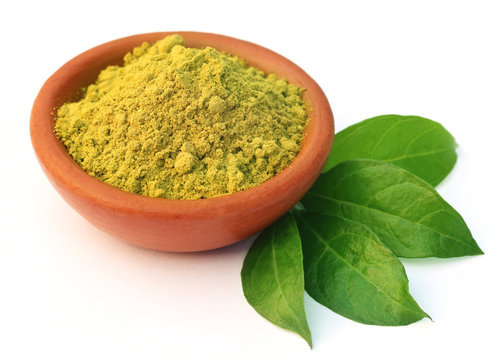Ayurvedic products and herbs, Henna
Top 10 Henna Leaves Benefits | Mehendi Leaves Benefits
Henna / Mehendi Leaves Benefits
Lawsonia inermis L., also known as Mehendi or henna, is a densely branched shrub or small tree grown for its various medicinal parts (stem bark, roots, flowers, and seeds). It thrives in tropical and subtropical climates.
Mehendi’s benefits are frequently mentioned in the history of Indian medicine, including Ayurvedic, Siddha, Unani, and Chinese medicine. Heena, which represents fertility, is an important part of our traditions. The herb’s popularity in India stems from its cooling effect, which is beneficial to people during the summer.
There is no shortage of health benefits of henna. Henna has the potential to relieve headaches, detoxify the body, improve nails, protect the skin, improve hair health, cool the body, reduce inflammation, and accelerate healing.
Its bark, seeds, or leaves can be used to make dye, aqueous extracts, tinctures, and salves. Because of its versatility, henna is an important part of traditional medicine, particularly Ayurvedic practice.
The most common forms of medicinal benefits are henna oil, bark, and seeds, and the plant’s high concentration of chemicals and nutrients may give it anti-inflammatory, hypotensive, antibacterial, astringent, and antiviral effects.
Contents
- Health Benefits & Uses of Henna
- 1) Henna leaves for hair color
- 2) Henna benefits for hair health
- 3) Mehendi leaves might reduce hair loss
- 4) Mehendi leaves may improve the nail quality
- 5) Henna may have anti-aging properties
- 6) Henna for healing wounds
- 7) Henna leaves benefits in reducing fever
- 8) Henna has anti-inflammatory properties
- 9) Henna leaves benefits sleep issues
- 10) Henna leaves benefits for detoxification
- Conclusion:
Health Benefits & Uses of Henna
Let’s take a closer look at henna leaves benefits and applications.
1) Henna leaves for hair color
In traditional medicine, henna is used as an astringent, purgative, and abortifacient. However, it is also used on hair. Heena is primarily used as a natural plant hair dye.
Henna has antifungal properties, making it beneficial for those suffering from dandruff, hair loss, and other microbial issues.
Henna helps reduce premature greying of hair because it contains tannins, a plant compound found in teas that contributes to their rich coloring.
2) Henna benefits for hair health
Although most people associate henna with hair coloring, it may also play a number of other roles in that part of our body. Henna may strengthen the hair, making it a safe dye that does not harm the health of our follicles in the long run. It may help to seal the cuticle of the hair, preventing breakage and improving the shine and appearance of the hair.
Henna contains vitamin E, which helps soften hair. The natural leaves of the plant are high in proteins and antioxidants, which promote hair health. Since ancient times, henna has also been used as a natural hair dye.
3) Mehendi leaves might reduce hair loss
The health benefits of henna are countless. People who are experiencing hair loss or baldness can benefit from henna. The traditional method is to mix henna juice or oil with curds before applying it to your hair, as this may increase the effectiveness of the treatment.
4) Mehendi leaves may improve the nail quality
People frequently underestimate the importance of maintaining healthy nails; however, the cuticles and space under the nails are prime locations for infection and bacterial presence; thus, treating your nails with henna may be a wise choice. Drinking water infused with leaves may help prevent nail cracking and inflammation. A poultice applied directly to the nail beds may relieve irritation, pain, and infection.
5) Henna may have anti-aging properties
Although henna’s antioxidant capacity has not been extensively researched, the oil may act as an astringent, prompting some people to apply its juice and oil to the skin to reduce the signs of aging and wrinkles, as well as the unsightly appearance of scars and other blemishes. This is supplemented by antiviral and antibacterial properties, which may protect the body’s largest organ, the skin.
6) Henna for healing wounds
The ability to protect the skin from infections and reduce inflammation is one of the most notable henna applications. It has been used for generations to treat burns, wounds, and scrapes, not only because it can add a protective layer against foreign pathogens and substances, but also because it has natural cooling properties that absorb heat from the skin. As a result, it may be as effective for sunburns as aloe vera gel.
7) Henna leaves benefits in reducing fever
According to Ayurvedic traditions, the antipyretic properties of henna may also help to reduce fevers. Extremely high fevers as a secondary symptom of another condition can be harmful to organ function and metabolic processes. It is critical to bring the body’s temperature down, and henna may be able to help by inducing sweating and thus effectively breaking the fever, or simply cooling the body and providing some relief.
8) Henna has anti-inflammatory properties
The juice of the henna plant is not always praised as particularly beneficial, but it can be applied directly to the skin for immediate headache relief. Henna compounds’ anti-inflammatory properties may aid in reducing tension and promoting healthy blood flow in the capillaries, which is a common cause of headaches and migraines. A rat model revealed that henna extract had an anti-inflammatory effect similar to the nonsteroidal anti-inflammatory drug phenylbutazone. Henna oil can also be used topically to treat arthritis and rheumatism.
9) Henna leaves benefits sleep issues
If you suffer from insomnia or chronic restlessness, incorporating a few drops of henna oil into your herbal regimen can help you re-establish a regular, restful sleep schedule by relaxing the body and mind before sleep.
10) Henna leaves benefits for detoxification
Drinking the resulting liquid after soaking the bark or leaves of the henna plant in water has been linked to improved spleen and liver health. The liver protects the body by assisting in the removal of toxins that build up in the body. By optimizing its function and ensuring its health, you can prevent a wide range of other health conditions. Before using any henna product, consult your doctor or a licensed herbalist. These were the top 10 henna leaves benefits.
Buy Henna Leaves Online: Buy Now
Conclusion:
Although most henna varieties are completely safe and non-toxic, some users have reported skin rashes and internal discomfort after using black henna. When used in its natural state, henna is most beneficial. A number of brands now sell powdered henna, but contamination due to a lack of quality control is possible. Using contaminated henna may cause an allergic reaction.
Consuming henna water or seeds should also be done with caution. Pregnant women should avoid using it because it has teratogenic properties that can cause miscarriage, according to a study.
Before incorporating any new herbal remedy into your routine, it is best to consult with your medical practitioner or an herbalist.
Also Read:
1) Ashwagandha for Height.
2) Health Benefits of Annatto.
3) Health Benefits Of Bay Leaves.
4) Health Benefits of Licorice.
5) Health Benefits of Thyme.
For more details on herbs & its remedies realted educational videos subscribe to our channels
https://www.youtube.com/@trustherb
https://www.instagram.com/trustherb.india/


